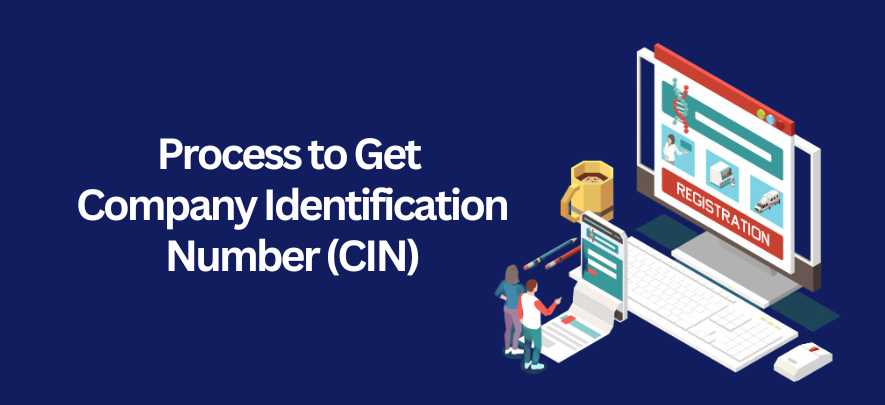How to Get a Company Registration Number or CIN in India?

Legal & Compliance
52 week ago — 10 min read
Many people have trouble figuring out how to get a company registration number or a CIN. Hence, this article will discuss what a CIN is, how to get one, and all other aspects related to CINs.
When a company in India registers with the Registrar of Companies (ROC), the Registrar of Companies will provide the company with a Corporate Identification Number (CIN), a 21-digit alphanumeric number. The CIN is utilized to monitor and track all of a company’s activities, starting with the company’s inception and continuing through all other activities that fall under the purview of the ROC.
When there is a need to find information about a company, the 21-digit CIN assigned can prove beneficial. For a company to conduct business in India, obtaining a CIN is required, and this number is used in all subsequent dealings with the ROC. In the later stages of its operations, the company will benefit from having a CIN if it has one.
What is meant by CIN Number?
The CIN is a 21-digit number that will be used to identify the company in the future, and it also contributes to establishing the legitimacy of an organization. The CIN number is issued to all companies owned by one person, like private Ltd. companies, ltd. companies, and all other companies registered in India.
The ROC is responsible for issuing the CIN number. Each state has ROC, and the company owners can get in touch with the experts from ROC to incorporate their businesses and avail CIN number.
Each state has the CIN number, apart from the ones on the eastern sides that don’t have the ROC. The CIN number is a unique number that helps identify the businesses and helps authenticate the company. With the CIN number, all the company’s basic information can also get tracked seamlessly.
Significance Of Obtaining a CIN Number
A company’s incorporation history can be traced back to its CIN number. Therefore, its primary function is to act as the representative number of the company, which is the only one of its kind across India.
How Is the Company Registration Number Created?
The Company Registration Number (CIN) encompasses various details, including:
- The first character of the CIN signifies whether the company is listed or unlisted. If it begins with ‘U,’ it indicates an unlisted company, while ‘L’ denotes a listed company
- The subsequent 5 digits denote the industry and activities in which the company is involved
- The following 2 digits serve as an abbreviation indicating the state of the company’s original registration (e.g., ‘RJ’ for Rajasthan)
- The next 4 digits reveal the registration year of the company
- The ensuing 3 letters represent the company’s ownership or structure type (e.g., ‘PLC’ for Public Limited Company, ‘SGC’ for State Government Company, ‘NPL’ for a Section 8 or Not-for-Profit Company, ‘OPC’ for a One Person Company)
- The final 6 digits constitute a unique registration number assigned by the Registrar of Companies (ROC). This number serves as the official identification for the company, distinguishing it from other registered entities.
What Is the Process for Obtaining the Company Registration Number?
Upon defining your business’s nature, securing the Company Registration Number (CIN) involves the following steps:
1. Acquire a Digital Signature Certificate (DSC)
Obtain a DSC from an accredited agency, facilitating the electronic signing of documents and forms online.
2. Apply for Director Identification Number (DIN)
Seek a DIN from the Ministry of Corporate Affairs (MCA), a unique identifier for each director associated with the company.
3. Register on the MCA Portal
Enrol as a new user on the MCA portal, utilising your DSC and DIN credentials.
4. Initiate Company Incorporation on the MCA Portal
Complete the incorporation process on the MCA portal, involving the submission of various forms, essential documents, and associated fees.
5. Legal Establishment with Certificate of Incorporation
Legally establish your company by obtaining a Certificate of Incorporation from the MCA, affirming your company’s name, address, and formation date.
6. Assessment and Approval by MCA
Subsequent to submitting all requisite documents and incorporation forms, the Ministry of Corporate Affairs will evaluate and approve the application, leading to the issuance of the unique Company Registration Number (CIN).
In What Context Should the CIN Number Be Mentioned?
There are a few key locations in which a company’s CIN number needs to be mentioned, including the following:
- Letterheads
- Receipts
- Bills and Invoices
- Annual reports
- Business letters
What Is the Importance of the Company Registration Number?
A company’s operations and activities are tracked and monitored using its Company Registration Number, which is issued by the Registrar of Companies (ROC) at the time of the company’s creation. This special 21-digit number needs to be given or shown in all paperwork and transactions pertaining to the ROC of the relevant state.
Fundamental information about a registered company under the Ministry of Corporate Affairs can be extracted thanks to the important meaning and ease of interpretation associated with the Company Registration Number. It makes primary information retrievable and makes it easier to identify and follow companies at different information levels that are kept up to date by the MCA/ROC.
Conclusion
As the article ends, you might have gained some insight into the meaning and working of a CIN number. To operate a business legally, you must obtain a CIN number, which provides the government with a means to monitor the company’s operations and verify that everything is running smoothly.
Company registration is essential, and it is a norm in the country. Regardless of whether the company is making profits or not, every company owner needs to make sure to register their company. A few guidelines need to be kept in mind when registering a company, and this is exactly where the role of experts comes into play.
FAQs
How can I get company CIN in India?
Obtain the Company Identification Number (CIN) by completing the company incorporation process through the Ministry of Corporate Affairs (MCA) in India.
How can I get a company registration number in India?
Secure the Company Registration Number during the incorporation process by registering your company with the MCA.
Is a CIN number mandatory for a company?
Yes, the CIN number is mandatory for a company in India. It serves as a unique identifier for legal and regulatory purposes.
What is the difference between registration number and CIN number?
The registration number is a generic term for any identification number assigned during registration. CIN (Company Identification Number) is a specific type of registration number assigned to companies.
How do I get my CIN registration certificate?
Once the company incorporation is approved, the Ministry of Corporate Affairs issues the Certificate of Incorporation, which includes the CIN.
How do I open a CIN number?
You don't ‘open’ a CIN number. Instead, you obtain it during the process of incorporating your company through the MCA.
How do I download a company's CIN number?
- Navigate to the MCA website
- Access the 'MCA Services' tab located on the homepage
- Choose the 'Check CIN' option within the drop-down menu under 'Company Services'
- Opt for the 'Search Based on Existing Company / LLP Name’
- Enter the company name in the 'Existing Company' section, input the captcha code, and initiate the search by clicking the 'Search' button’
- The company's CIN will be promptly displayed for your reference.
What is the benefit of a CIN number?
CIN is needed for every transaction with the relevant ROC and is used to monitor every facet and activity of a business since its establishment by the ROC. The 21-character CIN has a distinct meaning that is simple to translate and that aids in locating fundamental details about a business.
Can a proprietor firm have a CIN number?
No, the CIN number is specifically for companies, and a proprietorship doesn't have a CIN. It may have a different registration number, depending on the type of business.
Can two companies have the same CIN number?
No, CIN numbers are unique identifiers, and each company is assigned a distinct CIN by the Ministry of Corporate Affairs.
Also read: What is the difference between TIN, TAN, VAT, PAT, DSC and DIN?
To explore business opportunities, link with us by clicking on the 'Connect' button on our eBiz Card.
Disclaimer: The views and opinions expressed in this article are those of the author and do not necessarily reflect the views, official policy or position of GlobalLinker.
Posted by
Vakilsearch StaffGreetings! We would love to work with you and your company. We look forward to connecting with business houses and MSME's.
View Vakilsearch 's profile
Other articles written by Vakilsearch Staff
Know About the 4 Types of Partnership Firms
47 week ago
Most read this week












Comments
Share this content
Please login or Register to join the discussion